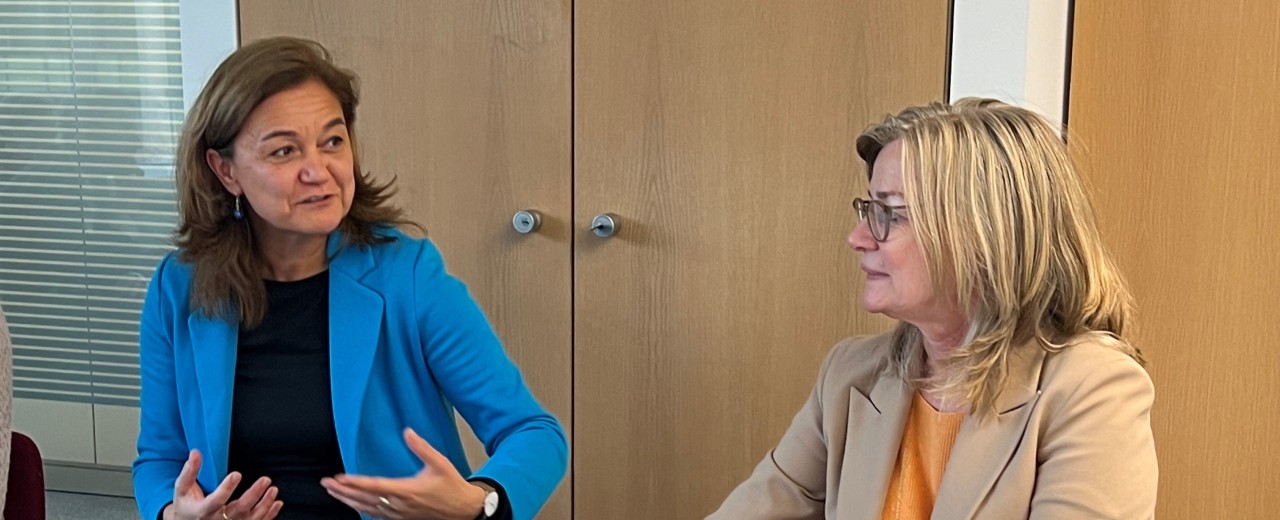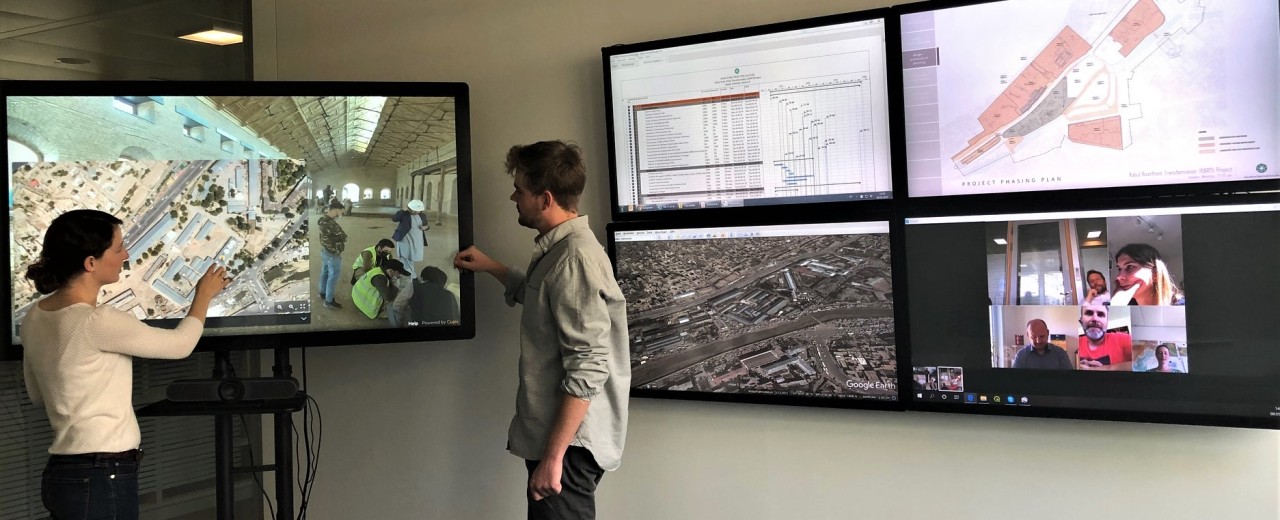Interview with Arlina Elmiger
“We’re making progress, but we still have a lot to do”KfW Director Arlina Elmiger in an interview with Friederike Bauer about the status digitalisation is at in development cooperation and why KfW has to meet its ambitious goals in this area.

Indeed, it has been clear for some time that the goals are ambitious, most recently since the SDG Summit in September 2023. However, it is also clear that we would hardly be able to achieve them without digitalisation. This is especially true now, given the difficult international situation we are in.
Actually, there is not a single sector in which digital technologies, the linking, recording and use of data, are not effective. A few examples: In gender equality, digital identification (e-ID) can significantly improve the financial inclusion and participation of women; data analytics can better tailor products, services and marketing channels to women’s needs. In the healthcare sector, digitalisation can reduce disparities, for instance by improving the rural population’s access to medical care using telemedicine. When it comes to climate-related issues, digital potential is far from being fully exhausted. Collecting and using climate-relevant data from sensors, satellites, data and management information systems helps to measure carbon reductions or model adjustment scenarios – not just in our projects, but beyond them, too. And last but not least, of course, the options to edit and advance things remotely are quite promising. Geodata can also provide valuable help in this regard. Working remotely is becoming increasingly important, especially for our own work as a development bank, since we can then do a lot of it from here.

Digitalisation can also lead to restrictions on freedoms, increase inequalities or dependencies on private groups. That’s why we want to support our partners in shaping their own digital transformation in a value-oriented, i.e. social and sustainable manner. Digital sovereignty is the keyword here and includes the promotion of public digital infrastructure and digital public goods in order to advance open systems and standards.
With TruBudget, the development bank has already developed an open source solution for DC and will now use it with many partner countries on behalf of the Federal Ministry for Economic Cooperation and Development (BMZ). TruBudget is a mature software solution that will fundamentally change cooperation with our partners in project financing. Based on blockchain technology, the software delivers reliable real-time data, enabling greater use of partner systems. TruBudget therefore not only improves transparency, but also sustainability and efficiency in development project administration. This is a major step towards greater digital and financial sovereignty for our project-executing agencies. We have also had TruBudget certified as a so-called “Digital Public Good”, i.e. as an open source application that contributes to achieving the sustainability goals.
We are in the middle and have our own department that shapes the digital transformation at KfW Development Bank with its employees. These include, for example, digital scouts who identify digital potential in the FC promotional portfolio. We have digital promoters who take care of networking KfW more closely with the outside world, and business analysts who translate the digital needs of employees into IT language and implement them in their own agile unit together with IT. All together we are trying to design these processes to be more efficient and, above all, to work seamlessly without requiring multiple inputs. Data play a key role in this. Because better data use and analytics will enable us to make more evidence-based financing decisions with a view to the best possible SDG contribution and manage our portfolio to make it more impact oriented. That is an enormous task.
We want to establish a portfolio management tool as a central platform for all our relevant internal processes that will place us in a position to organise our everyday work to be more digital and user-friendly. Our colleagues will then be able to quickly access relevant portfolio information and will also be guided through these processes. Using these methods not only makes it possible to digitally manage the portfolio, it also enables impact assessment and climate analysis. From maintaining central project data to planning milestones and related tasks throughout the project cycle, this will all be managed and updated in one place. We will use this to reduce media discontinuity and make cooperation easier within the team. Our numerous processes will become much simpler, clearer and more structured. We are also currently working at full speed on a so-called U&S app to digitally support the environmental and social impact assessment for FC projects. There will be a noticeable boost in digitalisation with the project planning tool and the entry and navigation cockpit, which we are currently preparing.
That's the idea. We have made an important step forward here with the “open data platform”, which provides an extensive catalogue of open data sources and promotes interoperable data exchange. Ultimately, the platform should of course also be accessible to our partners and peers.
We are currently more in the middle. That is why we need to step on the gas more, so we can deliver the big push we need. On the other hand, we have made significant progress in the digital portfolio: Around 27% of our new commitments have a digital component, compared to 10% in 2021. To exploit the digital potential in our projects and support our partners during the digital transformation process, we need innovative approaches to project planning, implementation and cooperation within Financial Cooperation, with partners and other stakeholders in this very dynamic environment. In this case, the following applies: The better we are positioned internally, the better we will be able to use the possibilities of digital technologies in projects. We can only competently advise our partners if we are familiar with these issues based on our own experience.
We still have a major challenge ahead, especially in accelerating the internal digitalisation. We are relatively far ahead when it comes to “remote management, monitoring and verification ( RMMV)”, i.e. controlling projects from a distance. In this area, we were able to use the time during the coronavirus pandemic to build on our extensive experience working on projects in fragile countries where we have had to plan and implement projects remotely for years due to security risks. At the beginning of 2023, we presented a number of relevant best-practice solutions at a virtual conference. An RMMV handbook has also been published to help KfW employees, project partners and service providers implement or better monitor projects even with limited access to the sites. We have also now equipped various offices in Frankfurt with the tools needed for virtual project visits, where it is possible to follow a building’s construction process in detail, for example. Alongside the above-mentioned open data platform, we now also have a search engine for unstructured data and a business intelligence tool for analysing our portfolio data. We are planning to use AI and expand job routines primarily so we can become faster and better at handling our processes. Digitalisation is not a sprint; it is a marathon.
The world has changed as a whole. Digitalisation is taking place everywhere. We all need to increase our technical expertise and integrate digital processes into our work if we want to keep pace in many areas. So I think that the general change we are experiencing at KfW is not any larger than in other areas of life. But it is also clear that we have to become more agile, adaptable and flexible in this new digital world.
Absolutely. Digitalisation is not an end in itself, something for technology-obsessed nerds. It always needs to have an objective and a direction. So, in addition to technology, systems and strategies, we also need to adopt a certain attitude, for example, when it comes to data protection issues. And we need people who are able to handle this technology. We will only be able to make effective use of the benefits of digitalisation in line with sustainability and the SDGs when all of these factors come together.
Share page
To share the content of this page with your network, click on one of the icons below.
Note on data protection: When you share content, your personal data is transferred to the selected network.
Data protection
Alternatively, you can also copy the short link: https://www.kfw-entwicklungsbank.de/s/enzBYYQY
Copy link Link copied